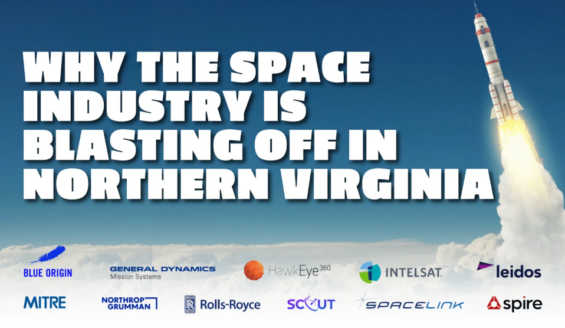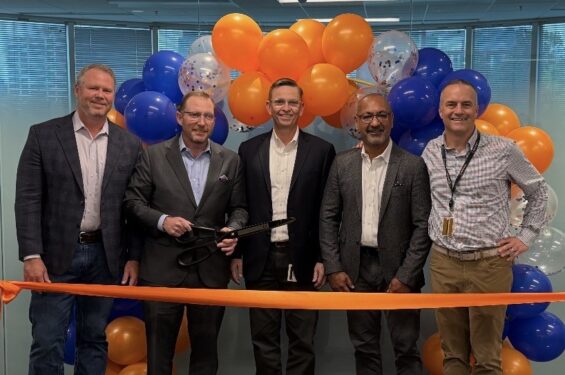April 5, 2022
E-Newsletter
10 reasons why Northern Virginia is a space and satellite company hub

Like a gold rush for a piece of the rapidly growing and evolving space business, companies of all sizes and many segments of the industry are establishing or building their presence in Fairfax County and Northern Virginia.
With its close proximity to the nation’s capital, the region is a hub for space and satellite companies, from small start-ups to government contracting giants with space operations such as General Dynamics Mission Systems (Fairfax), Northrop Grumman (Falls Church area), Leidos (Reston) and Peraton (Herndon).
And while there are other space hubs nationwide, Fairfax County and Northern Virginia offer a unique combination of assets that make the region a magnet for companies of all sizes with space-related operations.
A recent arrival in 2022 was Kent, Wash.-based Blue Origin, the aerospace manufacturer and sub-orbital spaceflight services company founded by Jeff Bezos of Amazon fame. Blue Origin’s Reston office is the company’s newest engineering Center of Excellence, with its focus on space architecture, launch vehicle systems analysis, launch vehicle component design and validation, and safety and mission assurance.
Spire Global, which provides space-based data, analytics, and space services and has offices in San Francisco, Boulder, Colo., Glasgow, Luxembourg and Singapore, opened its new headquarters office in Tysons in October 2021 to accommodate the company’s growing team that provides support to its federal clients.
To find out why Northern Virginia is a growing space hub, the Fairfax County Economic Development Authority talked to five space and satellite company experts.
These industry experts told us there are 10 reasons why the space industry has blasted off in Northern Virginia:
1. Location near the federal government
With its location nearby to the nation’s capital, Fairfax County is nearby to NASA, the Department of Defense, the U.S. Space Force, and other agencies with space-related operations, including the National Geospatial-Intelligence Agency and the National Reconnaissance Office.
At McLean and Bedford, Mass.-headquartered MITRE, proximity to the nation’s capital provides “access to our sponsors, the government agencies whose missions we support,” said Kerry Buckley, Vice President, Center for Advanced Aviation System Development, MITRE.
MITRE’s space efforts span numerous federal agencies with space missions and authorities, including the Department of Defense, the Department of Commerce and NASA.
“This is especially important as space missions across agencies evolve to address the growing space industry at the federal, commercial and economic level. We have entered a pivotal era that requires not only a whole-of-government approach, but a whole-of-nation perspective as well,” Buckley added. “The Washington metropolitan area is a leader in innovation, drives policy, and boasts a wealth of academic resources – all essential factors for advancing and preserving the space domain.”
Northern Virginia offers a number of benefits to space companies from innovative startups to well-established large companies, Buckley said. “Proximity to our legislative bodies and the federal agencies is essential for all space companies given the rapid growth and dynamic expansion of the industry.”
Whereas MITRE has had a long-time presence in Fairfax County since 1963, space communications company Axta Space Corporation was established in 2022. Among the reasons for the decision to locate Axta Space Corporation in Northern Virginia was proximity to government agencies, said Dave Bettinger, Axta Space Corporation’s Founder and CEO.
“A lot of the agencies that our relay system will serve are here, whether it’s NASA, or the intelligence agencies such as the National Reconnaissance Office, the National Geospatial-Intelligence Agency, and others,” Bettinger said.
Proximity to the federal government is also important because the space industry is very regulated, added Eric Ingram, CEO of SCOUT, a space tech startup he launched in Fairfax County in 2019 that is developing the next generation of space traffic management and autonomous proximity operations services, to make space a safer and more sustainable environment.
“At the minimum, you’ve usually got three different regulatory bodies that are involved in space licensing,” Ingram said. “So being able to interact and engage with government and those putting together regulations, those advising the regulations, is important.”
2. Proximity to other companies
Another big draw for companies to locate in Fairfax County and Northern Virginia is the proximity to other space and satellite companies. This is beneficial for partnerships and collaboration purposes, as well as for finding customers.
“All the big space business players have a presence in Fairfax County and Northern Virginia in general that it was a no-brainer for me to decide this is where we’re going to make our headquarters,” said Bettinger.
“Almost every space company at least has a small office here, as well as a lot of the suppliers. Companies and industries adjacent to what we’re doing in the space industry also have some sort of presence either in Northern Virginia or the D.C. region,” Ingram added. “And so it’s geographically advantageous to be in this area.”
In addition, public-private partnership opportunities with NASA have enabled more companies to enter the space business, including in Virginia.
“I expect this to grow, particularly as the government will continue to be a significant customer. I think that there are many businesses that are going to want to be here, either to have a significant presence here, or be headquartered here,” said Kevin Pomfret, space and spatial corporate and transaction attorney in the Tysons office of the Williams Mullen law firm. “I think both U.S. companies and foreign companies that want to get into the commercial market or sell to the government, will look as Virginia as a good place to be to in order be close to both customers and regulators.”
An unparalleled benefit of being located in a space and satellite hub are the opportunities for networking within the industry.
“The increased presence of locally-based space companies in this area opens up more opportunities for organic relationship building and interaction between companies that could help facilitate deals being made in companies working together, or becoming vendor customers. So if they didn’t have a presence here, that is a much less likely chance that would happen,” Ingram said.
“This was very true pre-pandemic, but even now, as things are starting to open up. I was at a gala dinner recently and met an industry colleague from Spire Global and at the table next to me was an Air Force General, who I was able to talk to about what we were doing as a company,” Ingram explained. “These are types of opportunities to connect with industry colleagues that don’t always present themselves in San Diego, or places like that.”
3. NOVA is an international hub
International Launch Services is based in Reston and has managed satellite launches from the Baikonur Cosmodrome in Kazakhstan. Not only a hub for U.S.-based companies, the region continues to attract foreign-based companies such as Luxembourg-based Intelsat and U.K.-based OneWeb, both of which landed in Tysons, France-based Airbus North America (Herndon), and U.K.-based Rolls-Royce North America (Reston).
With its location next to Washington, D.C., Fairfax County is also convenient for space and satellite companies that want to do business with foreign nations via the embassies and diplomatic missions, and with international organizations. Connections between their home markets and U.S. markets through Washington Dulles and Ronald Reagan Washington National airports also rates high with international firms.
4. We’ve got talent
Talent is another key lure for companies that are locating new offices in Fairfax County. And this holds true for entry-level through and mid- and executive-level experienced professionals.
“There’s a huge talent pool of experienced communications and aerospace engineers to draw from in Northern Virginia. So we’re looking at a very smart play for us to be in this area,” Bettinger said. I decided to set up Axta Space Corporation here in Northern Virginia quite simply because of the number of space-savvy engineers, executives and salespeople in this region.”
The Work in Northern Virginia website funded by the Fairfax County Board of Supervisors and created by the Fairfax County Economic Development Authority lists all open jobs in the region.
5. Space and engineering education
Another key asset is the educational systems in Virginia and the region. Several universities in Virginia offer space-specific programs and are developing the pipeline of talent needed across the region to advance solutions to the industry’s most pressing space challenges, according to Buckley.
The Virginia Space Grant Consortium (VSGC), for example, is a coalition of five Virginia colleges and universities, NASA, state educational agencies, the Virginia Innovation Partnership Corporation, and other institutions representing diverse aerospace education and research.
6. Investors like what is happening here
The financial community is showing a strong interest in getting involved with the space field, particularly as they see the government increasing as a customer, according to Pomfret.
“The financial community, including private equity, venture capital and investment banks, all see space as an industry one where there will be increased opportunities. And that interest helps to create an ecosystem that is necessary to foster continued growth,” Pomfret stated.
“More and more companies, private equity groups and others, are looking at Northern Virginia and some of the companies that are here that are space-related as an opportunity. For example, Hawkeye 360, which is a Herndon-based company, had a fairly significant Series D round, with fairly large financing,” he noted. “So I think you’re seeing more and more of that in Northern Virginia and a lot of that sort of builds on itself. And so that’s going to be a competitive advantage for this community.”
7. Assets across the Commonwealth…
Statewide, Virginia’s varied and diverse urban/rural area topography may be beneficial for a space or satellite company, depending on needs for office space or production or testing facilities.
NASA runs the Langley Research Center in Hampton, Va. The state also is home to one of just four spaceports with FAA approval. The Virginia Commercial Space Flight Authority (Virginia Space) administers all commercial spaceflight operations within the Commonwealth, including launch activities at the Mid-Atlantic Regional Spaceport (MARS), located at the NASA Wallops Flight Facility on the Eastern Shore of Virginia.
In addition, Virginia has a very large port system, noted Dave Bowles, executive director, Virginia Institute for Spaceflight and Autonomy at Old Dominion University in Norfolk. Virginia’s huge military presence that drives a lot of aerospace innovation, Bowles said.
Another benefit of being located in the state is that the paperwork is “less burdensome” than in California, according to Ingram. “It’s a lot easier to work with paperwork wise and cost-wise per employee, especially as a startup, in Virginia, than potentially in other locations.”
Virginia also has a Zero Gravity, Zero Tax state tax incentive for companies to locate and headquarters space launch and flight launch and training businesses operations in the state.
8. …and across the DMV
A key factor for many companies is being located nearby to assets across the Potomac, including NASA headquarters in Washington, D.C., and the NASA Goddard Spaceflight Center in Greenbelt, Md.
9. The industry has deep roots here
One of the reasons for the region becoming a space and satellite hub is that the Washington region was at the apex of the beginnings of the space flight development.
“The state of Virginia has a strong history of supporting space research and development dating back to the Apollo moon missions and extending into the current 2024 Artemis moon mission” Buckley said. “Virginia’s prioritization of space research and development also has been demonstrated through the 1995 creation of the Virginia Commercial Space Flight Authority and NASA Wallops Flight Facility, a regional commitment to space advancements.”
The roots of the satellite industry, which is a subset of the overall space industry, can also be found in the Washington, D.C. region, going back to the establishment of COMSAT and Intelsat in the 1960s, Bettinger said.
“If you examine the heritage of all the different space-related companies in the region, you will find that about 90 percent of them have a connection to those two important pioneers,” Bettinger explained.
10. ‘Life’ opportunities too
“Quality of life” for employees and their families is a key factor as well, Ingram said. Fairfax County has a highly regarded public school system, a variety of urban, suburban and rural options for housing; safe communities, and lots of recreational and cultural activities.
“And the good part about Northern Virginia is like you’re only like three hours away from being at the beach or at the mountains at any point,” Ingram added.
To find out more on how to position your company in Fairfax County’s space and satellite hub, contact David Kelley, the Fairfax County Economic Development Authority’s Director of National Business Investment at dkelley@fceda.org.


